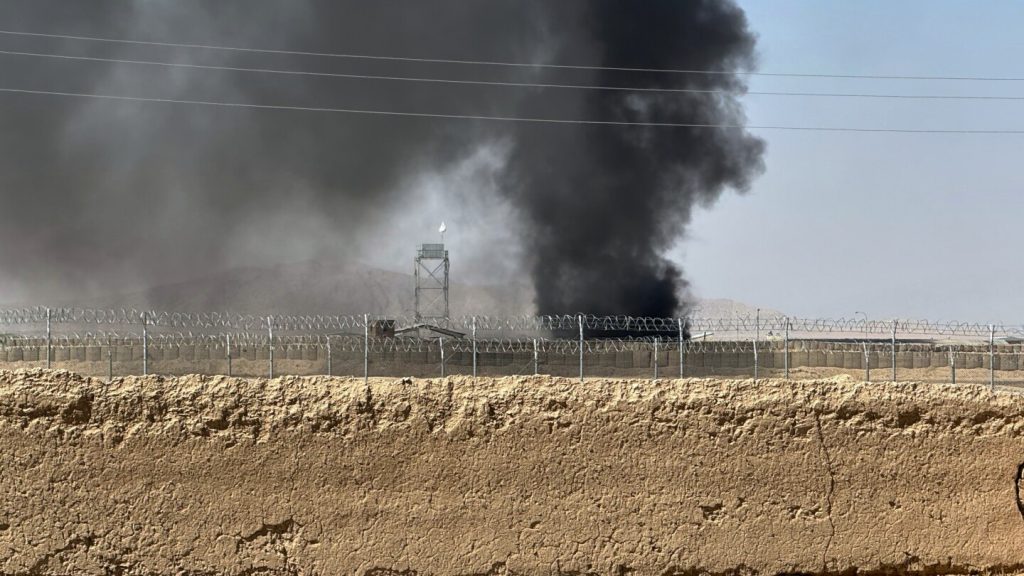Listen to the article
Pakistan and Afghanistan Continue Peace Negotiations Amid Fragile Ceasefire
Pakistani and Afghan officials have been engaged in a series of peace talks in Istanbul, Turkey, as they work to maintain a tenuous ceasefire following the deadliest cross-border clashes in years that have claimed dozens of lives on both sides.
The conflict escalated after an October 9 explosion in Kabul and another in Afghanistan’s southeastern Paktika province. The Taliban-led Afghan government immediately attributed these attacks to Pakistan, though Pakistani officials have neither confirmed nor denied involvement.
Since then, both nations have engaged in artillery exchanges and military strikes across their shared 2,611-kilometer (1,622-mile) frontier, known as the Durand Line. The border, established in 1893 by British diplomat Mortimer Durand, has long been a point of contention as Afghanistan has never formally recognized it as Pakistan’s western border.
The casualty reports from the fighting highlight the contentious nature of the conflict. Pakistan’s military spokesman Lt. Gen. Ahmad Sharif claimed more than 200 Afghan soldiers and over 100 militants were killed when Pakistani forces targeted what they described as militant hideouts and army positions in Afghanistan. Afghan government spokesman Zabiullah Mujahid rejected these figures, stating that only nine Afghan soldiers had been killed and 22 wounded, while 45 civilians had lost their lives and 102 were injured.
Similarly, Afghanistan claimed 58 Pakistani soldiers had been killed, but Pakistan disputed this number, reporting 23 military casualties from the conflict.
The escalating tensions prompted Qatar to facilitate initial peace talks in Doha, resulting in a ceasefire agreement on October 19. Two subsequent rounds of negotiations have been held in Istanbul, with the latest beginning on November 6. However, these talks stalled the following day and ended without resolution. Despite both sides maintaining that the ceasefire is holding, reports of violence continue, with an Afghan official reporting that overnight clashes in the border area killed four Afghan civilians and wounded five others.
At the heart of the conflict is Pakistan’s accusation that Afghanistan is harboring the Pakistani Taliban, known as Tehrik-e-Taliban Pakistan (TTP), allowing them to launch attacks inside Pakistan. The TTP, formed in 2007 and designated a terrorist organization by both the United Nations and United States, seeks stricter enforcement of Islamic laws, the release of imprisoned members, and reduced Pakistani military presence in the border province of Khyber Pakhtunkhwa.
Afghanistan’s Taliban government denies these allegations, insisting it does not permit its territory to be used for attacks against any country. Afghan officials have refused Pakistan’s demands to hand over TTP leaders, arguing that Pakistan’s conflict with the group is an internal matter that should be resolved through direct negotiations.
Pakistan’s Defense Minister Khawaja Muhammad Asif recently warned of the possibility of “open war” if Afghanistan fails to take action against the TTP, which has claimed responsibility for numerous attacks within Pakistan in recent months.
The international community has expressed concern about the conflict, particularly as the region is known to harbor other militant groups, including al-Qaeda and Islamic State. Both Qatar and Turkey have played key roles in mediating the ceasefire and peace talks, aiming to prevent full-scale conflict and establish a framework for border security.
U.S. President Donald Trump added his voice to the diplomatic efforts during an ASEAN summit in Malaysia, stating his intention to resolve the conflict “very quickly.” His comments came as the second round of Istanbul talks collapsed, with Pakistan accusing Kabul of refusing to act against the TTP.
Despite these setbacks, the ceasefire has largely held since October 19, offering some hope that continued diplomatic engagement might eventually lead to a more permanent resolution to the long-standing border tensions between the neighboring nations.
Fact Checker
Verify the accuracy of this article using The Disinformation Commission analysis and real-time sources.




10 Comments
This conflict highlights the complex regional dynamics at play. While Pakistan and Afghanistan have their own national interests, finding a mutually acceptable solution is crucial for regional stability. I hope the negotiators can put aside their differences and work towards a sustainable agreement.
This ongoing conflict along the Durand Line is incredibly complex. Both Pakistan and Afghanistan have legitimate grievances, but further escalation will only lead to more suffering. I hope the peace talks can make progress and find a diplomatic solution.
Given the fragility of the ceasefire, the stakes for these peace talks are extremely high. Both sides will need to show flexibility and good faith if they want to make headway on resolving this long-running border conflict.
Absolutely. Confidence-building measures and incremental progress will be key. Even small steps towards de-escalation could open the door for more substantial negotiations down the line.
The casualty figures from the recent clashes are alarming. While the border dispute has deep historical roots, continued military confrontation is not the answer. Constructive dialogue and compromise will be crucial to achieving a lasting peace.
The Taliban’s accusation of Pakistani involvement in the recent attacks is concerning. If true, that would seriously undermine the peace process. However, without clear evidence, I hope both sides can avoid inflammatory rhetoric and focus on finding common ground.
The heavy casualties on both sides underscore the urgent need for a diplomatic solution. I’m curious to see if the current talks can build enough momentum to overcome the longstanding mistrust between Pakistan and Afghanistan.
Agreed. Restoring trust will be critical. Any progress, even small, could help create an environment more conducive to substantive negotiations on the border dispute and other contentious issues.
With the Taliban now in power in Afghanistan, the geopolitical landscape has shifted. It remains to be seen whether this will help or hinder the peace process with Pakistan. Navigating these complex regional dynamics will be a major challenge for the negotiators.
The Durand Line has been a source of tension for over a century. Resolving this border dispute will require creativity and compromise from all parties involved. I’m cautiously optimistic the current talks can make headway, but the path to a lasting peace will not be easy.